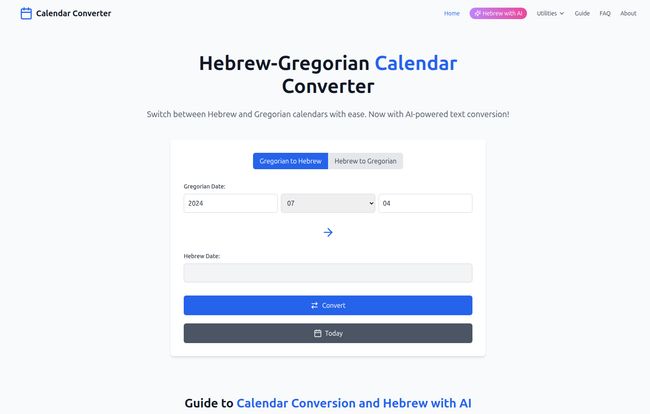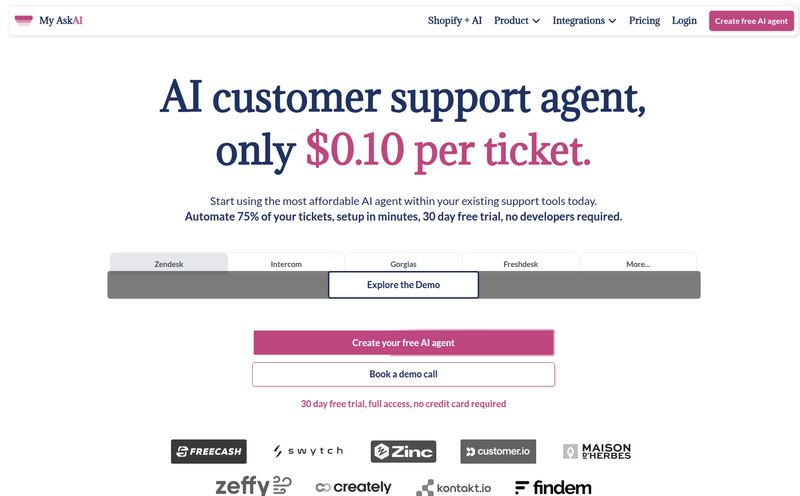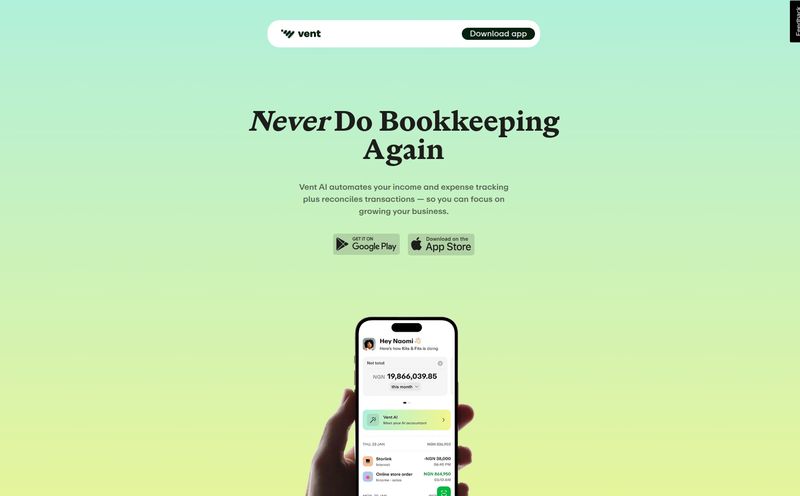As much as I live and breathe the digital world, some of the old ways are just… sticky. And for me, nothing is stickier than trying to align the Hebrew calendar with the Gregorian one we all use for our Google Cal invites. It’s a bit like trying to solve a Rubik's Cube in the dark. You know all the pieces are there, but getting them to line up feels like a minor miracle.
For years, I’ve jumped between clunky websites, squinted at confusing charts, and generally just guessed when it came to planning anything around Jewish holidays or figuring out a historical date for a client's project. Is the 15th of Shevat this year on a Tuesday or a Wednesday? When exactly was the 10th of Tevet back in 1952? My brain just isn’t built for that kind of lunisolar gymnastics.
So when I stumbled upon this super clean, no-fuss Hebrew-Gregorian Calendar Converter, I was intrigued. But when I saw the little tag that said “AI-powered,” my SEO-nerd senses started tingling. AI? For converting dates? Okay, now you have my full attention.
First, Let's Look at the Interface
The first thing you notice is how clean it is. There are no flashing banner ads, no pop-ups asking you to subscribe to a newsletter before you’ve even done anything. It’s just… a converter. What a concept! You’re presented with two simple tabs: “Gregorian to Hebrew” and “Hebrew to Gregorian.” You pick one, plug in the date, and hit the big blue “Convert” button.
It’s the kind of beautiful simplicity that makes you wonder why other tools feel the need to be so complicated. It respects your time. I plugged in my own birthday, and in less than a second, it spit out the Hebrew date. Simple. Effective. Done.

Visit Hebrew Calendar Converter
The Mysterious AI Feature
Okay, so what’s this “AI-powered text conversion” all about? The site is a little coy about the details, but my guess is it’s more than just a simple date-flipper. I imagine it’s designed to parse natural language. For example, you might be able to type “What was the Hebrew date two weeks before Passover in 1988?” and it would figure it out. If that’s the case, that’s a pretty neat party trick.
While I couldn’t test this specific function directly from the main interface, the promise of it is exciting. It moves the tool from a simple calculator to a genuine assistant. It’s the difference between using a calculator to add numbers and asking Siri or Alexa what the total is. One is a tool, the other is a service. This feels like it's aiming for the latter, and I'm here for it.
Who Is This Tool Actually For?
Beyond satisfying my own curiosity, this converter has some seriously practical applications. I can see a few groups of people really getting a lot of milage out of this.
Event Planners and Families
If you're planning a Bar or Bat Mitzvah, a Jewish wedding, or even just a family dinner around a holiday, you know the struggle. You have to find the Hebrew date, figure out what day of the week that falls on, and then pray it doesn’t clash with some other secular event. This tool takes the guesswork out of it. You can easily find the correct date for a ketubah (the Jewish marriage contract) or determine a child's Torah portion. It's a small thing that removes a huge logistical headache.
The Historians and Genealogy Buffs
This is where I get really excited. I’ve done some genealogy work on the side, and old family records—tombstones, letters, official documents from the 'old country'—often use Hebrew dates. Being able to quickly and accurately convert the Yahrzeit (anniversary of a death) of a great-great-grandparent from the 2nd of Adar in 1895 to a Gregorian date is invaluable. It helps build a much richer, more accurate family tree.
Everyday Use
And of course, there’s just the fun of it. Want to know your Hebrew birthday? Or what today's date is on the Jewish calendar? It’s a neat way to connect with a rhythm of time that’s been ticking along for millennia. It’s a small link to a huge history.
The Good, The Bad, and The Quirky
No tool is perfect, right? Especially not a free one. In my experience, it’s all about whether the good outweighs the bad. So here’s my honest breakdown.
On the plus side, the interface is incredibly easy to use. It’s intuitive, fast, and does exactly what it says on the tin. The AI potential is a massive bonus, pointing toward a smarter, more helpful future for web tools. This isnt your grandfather's date converter.
Now for the caveats. The site notes that it requires JavaScript to run, which is standard for like, 99% of the modern web, so it's not a real issue for most folks. More importantly, it mentions there are year range limitations (though it doesn't specify what they are) and that date matching isn't always exact. This is a crucial point. The Hebrew calendar is notoriously complex, with leap months and postponements that can make one-to-one conversions tricky, especially for ancient dates. So, if you're an academic writing a dissertation on Second Temple period texts, you might still want to double-check with more scholarly sources like the work of scholars at My Jewish Learning. But for planning your cousin’s Bar Mitzvah? It's more than accurate enough.
What About the Price Tag?
Here’s a fun little tidbit. I’m a professional, so I always look for the pricing page to see if a tool has a premium tier. I clicked the link, and… I got a 404 error page. A “Page Not Found.” Honestly, I loved it. It was such a human moment. Instead of a generic error, it had a quote from the Talmud. Classy touch.
The upshot? As far as I can tell, this tool is completely free. There's no paywall, no subscription, no “pro” version to be found (even if the link is a bit lost at the moment). For the value it provides, that's pretty fantastic.
Frequently Asked Questions
What are the year limitations for this converter?
The tool's creators mention there are some limitations on the year ranges for conversions, but they aren't specified on the site. For most modern and recent historical dates, it should work perfectly. For very ancient dates, you might want to cross-reference your findings.
Why don't the Hebrew and Gregorian dates always line up perfectly?
It boils down to calendar science! The Gregorian calendar is solar, based on the earth's trip around the sun. The Hebrew calendar is lunisolar, a blend of lunar months and solar years. To keep the seasons aligned, the Hebrew calendar adds a whole extra 'leap month' 7 times in a 19-year cycle. This complexity can sometimes lead to slight ambiguities in how dates are represented, especially around sunset, which marks the start of a new day in the Jewish calendar.
So, how accurate is it?
For 99% of practical uses—like event planning, finding holiday dates, or converting modern birthdays and anniversaries—it's very accurate. The creators are just being transparent that for deep, academic-level historical research, no single digital tool should be your only source. Always a good policy.
What exactly is the AI feature?
The site describes it as an “AI-powered text conversion” feature. While the main interface is a standard date picker, this suggests a more advanced capability, likely for interpreting dates written in natural sentences or more complex queries. It's one of the tool's most forward-thinking aspects.
Do I need to install software to use this?
Nope! It’s a web-based tool. As long as you have a modern web browser with JavaScript enabled (which you almost certainly do), you’re good to go. No downloads, no installations, no fuss.
Is This Calendar Converter Worth a Bookmark?
My verdict? Absolutely. Yes.
This isn't some revolutionary, industry-shattering platform. It doesn’t promise to reorganize your life. What it does is solve a very specific, often frustrating problem with elegance and simplicity. It’s a sharp, well-made tool that does its job without getting in your way. The clean design, the speed, and the intriguing AI feature make it a standout in a field of otherwise dated and clunky options.
Whether you're deeply connected to the Jewish calendar or just have a passing curiosity, this Hebrew Calendar Converter is a fantastic resource to have in your digital toolbox. It's already earned a spot on my bookmarks bar, and I have a feeling it’ll be staying there for a long, long time.
Reference and Sources
- The Hebrew-Gregorian Calendar Converter tool itself.
- My Jewish Learning - The Jewish Calendar: For more in-depth information on the structure of the Hebrew calendar.
- Wikipedia - Hebrew Calendar: A solid source for the history and mechanics of the calendar, including the Metonic cycle.



